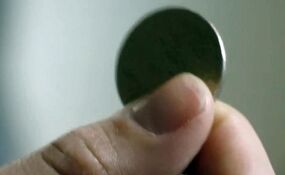Guinea: Difference between revisions
No edit summary |
(Adding categories) |
||
| (10 intermediate revisions by 7 users not shown) | |||
| Line 1: | Line 1: | ||
[[ | {{wikipediainfo|Guinea (British coin)}} | ||
A '''guinea''' was a form of [[British]] currency. | [[File:guinea.jpg|thumb|What [[Jenny Flint|Jenny]] called a "guinea". ([[TV]]: ''[[The Crimson Horror (TV story)|The Crimson Horror]]'')]] | ||
A '''guinea''' was a form of [[British]] currency. | |||
== References == | |||
Despite being a nominal prisoner, [[Polly Wright|Polly]] stole twenty guineas from [[British Army]] [[Lieutenant]] [[Algernon Ffinch]] in [[1746]]. ([[TV]]: ''[[The Highlanders (TV story)|The Highlanders]]'') | |||
[[Edward Hardiman]] once made a wager for one hundred guineas that he was not able to cover, much to [[Jack Harkness]]' displeasure. ([[PROSE]]: ''[[Best Friends (short story)|Best Friends]]'') | |||
In [[1893]], [[Jenny Flint]] offered a woman named [[Abigail (The Crimson Horror)|Abigail]] a guinea to create a diversion in the new recruits' receiving line at [[Sweetville]]. ([[TV]]: ''[[The Crimson Horror (TV story)|The Crimson Horror]]'') | |||
In the [[1890s]], [[Henry Gordon Jago]] owed 500 guineas to the [[bank]]. ([[AUDIO]]: ''[[The Ruthven Inheritance (audio story)|The Ruthven Inheritance]]'') | |||
== Behind the scenes == | == Behind the scenes == | ||
The exact nature of a guinea is never really discussed in the [[DWU]]. | The exact nature of a guinea is never really discussed in the [[DWU]]. But if we were to adopt real world history, then we'd have to say that a guinea is both an actual coin and, since the early 19th century, slang for the typical value of that coin: 21 [[shilling]]s. ''Guinea'' is thus a word that means "a little over a [[pound sterling]]". | ||
The prop seen in ''[[The Crimson Horror (TV story)|The Crimson Horror]]'' doesn't match any known iteration of a guinea, but this makes some sense as guineas were long since out of circulation by [[1893|the year in which ''Crimson'' was set]]. Still, it's unclear exactly what this coin is supposed to be, since pound coins — the closest coin to the value of a guinea — wouldn't show up for almost a century. Of course, the [[DWU]] is a vastly different place to the real world, and such contradictions with real life history shouldn't be read as "incorrect". | |||
[[Category:Currency from the real world]] | [[Category:Currency from the real world]] | ||
[[Category:Jargon, slang and colloquialisms]] | [[Category:Jargon, slang and colloquialisms]] | ||
[[Category:British currency]] | |||
Latest revision as of 00:15, 30 August 2021
A guinea was a form of British currency.
References[[edit] | [edit source]]
Despite being a nominal prisoner, Polly stole twenty guineas from British Army Lieutenant Algernon Ffinch in 1746. (TV: The Highlanders)
Edward Hardiman once made a wager for one hundred guineas that he was not able to cover, much to Jack Harkness' displeasure. (PROSE: Best Friends)
In 1893, Jenny Flint offered a woman named Abigail a guinea to create a diversion in the new recruits' receiving line at Sweetville. (TV: The Crimson Horror)
In the 1890s, Henry Gordon Jago owed 500 guineas to the bank. (AUDIO: The Ruthven Inheritance)
Behind the scenes[[edit] | [edit source]]
The exact nature of a guinea is never really discussed in the DWU. But if we were to adopt real world history, then we'd have to say that a guinea is both an actual coin and, since the early 19th century, slang for the typical value of that coin: 21 shillings. Guinea is thus a word that means "a little over a pound sterling".
The prop seen in The Crimson Horror doesn't match any known iteration of a guinea, but this makes some sense as guineas were long since out of circulation by the year in which Crimson was set. Still, it's unclear exactly what this coin is supposed to be, since pound coins — the closest coin to the value of a guinea — wouldn't show up for almost a century. Of course, the DWU is a vastly different place to the real world, and such contradictions with real life history shouldn't be read as "incorrect".

